Contributions to Sustainable Development
How We See CSR at the Sumitomo Corporation Group
In the preamble to the Sumitomo Corporation Group Management Principles, the corporate vision of the group is described by the following: “We aim to be a global organization that constantly stays a step ahead in dealing with change, creates new value, and contributes broadly to society.” For us then, promoting CSR means conducting responsible business activities based on our corporate vision, which is also the same as implementing the Group's Management Principles. We work on social issues from the standpoint of a corporation while building better relationships with stakeholders through sound business activities and social contribution activities, with the aim of building a sustainable society. For us, this means achieving prosperity and realizing the dreams of all our stakeholders, and we recognize this as the fundamental basis of CSR.

Initiatives for the United Nations Global Compact
The Sumitomo Corporation Group supports the 10 principles of the UN Global Compact (GC), an international CSR-related initiative that proposes values held in common with the Group's Management Principles. We are committed to enhancing our corporate value by clearly identifying areas of improvement in our business activities in light of the values advocated by the 10 principles. * We also support the Global Human Rights Declaration, which the 10 principles of the UN Global Compact comply with.
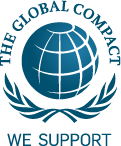
Report on Responsibility & Sustainability
For details on our CSR activities, please refer to our Report on Responsibility & Sustainability. The report is available on our website:
Report on Responsibility & Sustainability
Initiatives for the Supply Chain CSR
The Sumitomo Corporation Group set down the CSR Action Guidelines for Supply Chains. By implementing these guidelines, which are based on our Management Principles, we are aiming to achieve a sustainable and better society by working together with our suppliers and business partners in order to create new values while at the same time fulfilling our social responsibilities in such areas as strict compliance with laws and regulations, respect for human rights, and protection of the environment.
THE SUMITOMO CORPORATION GROUP CSR ACTION GUIDELINES FOR SUPPLY CHAINS
(November 2009)The Sumitomo Corporation Group aims to be a global organization that constantly stays a step ahead in dealing with change, creates new value and contributes broadly to society. In its Management Principles, the Group sets forth its mission to achieve prosperity and realize dreams through sound business activities, and to strictly adhere to a management style which places prime importance on integrity and sound management with utmost respect for the individual.
In line with its Management Principles, the Sumitomo Corporation Group hereby sets down the CSR (Corporate Social Responsibility) Action Guidelines for Supply Chains, aiming to achieve a sustainable and better society. With a view to further strengthening “global relations”—one of the elements of the business foundation that supports our integrated corporate strength, which is our core competence—we will request our suppliers and business partners to kindly accept, understand and practice these guidelines so that together we can fulfill our social responsibilities in the value chain in which we are jointly involved.
Our suppliers and business partners are expected:
- To respect the human rights of employees and never treat employees in an inhumane manner
- To prevent forced labor, child labor and unreasonably cheap labor
- Not to practice discrimination with respect to employment
- To respect the rights of employees to associate freely in order to ensure smooth negotiation between labor and management
- To strive to provide employees with a safe and healthy work environment
- To strive to protect the global environment
- To ensure the quality and safety of products and services
- To ensure fair transactions, abiding by all applicable laws, rules and regulations, and to prevent all types of corruption, including extortion and bribery
- To disclose information regarding the above in a timely and appropriate manner
Global Safety Management
The Sumitomo Corporation Group puts “safety first” in its business activities. Endeavoring to better prepare for and prevent incidents, accidents and disasters in Japan and overseas, we regularly conduct educational activities and upgrade our safety planning infrastructure. Through these means, we work diligently to ensure that all executives and employees maintain a deep awareness of crisis situations, understand all appropriate safety guidelines and measures and put them into practice.
As a part of the aforementioned endeavors, we are striving to realize “zero” workplace accidents at subsidiaries and associated companies engaged in manufacturing, processing and warehouse activities. A Safety Management Committee has been established at each Business Unit. These committees take action to ensure safety management and prevent workplace accidents together with Group subsidiaries and associated companies in Japan and overseas.
Measures to Improve Safety Awareness and Prevent Accidents
In the Metal Products Business Unit, all subsidiaries and associated companies document their safety activities in accordance with the Group's Safety Manual, Safety and Hygiene Management Guidelines, and Work handbooks, and every employee is appropriately trained on safety in the workplace. This vigilance helps prevent accidents before they can happen.
In the Tubular Products Group's worldwide operations, there has been a major focus on strengthening the capabilities of the HSE Global Organization.
The availability of resources has been enhanced with the recruitment of HSE Managers in both the European and Americas Business Units. In conjunction with existing HSE Specialists, the Global HSE Network has been developed to ensure the standardization of HSE Management Systems, and to expedite the implementation and transfer of best practices. The sharing of information and inter-Business Unit communication has improved significantly.
With its increased strength, the Global HSE Network has allowed the Tubular Products Group to work together with the management and workers engaged in Supply Chain Management (SCM) operations and also the subsidiaries to improve HSE activities and performance more effectively. In fiscal 2011, over twenty reviews were completed in SCM and subsidiaries' in North American, European, Middle Eastern and Far Eastern locations to identify and subsequently implement HSE improvements.
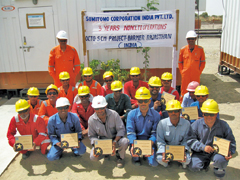 Indian SCM Project celebrating “3 Years No-Lost Time Incidents” (Barmer, India)
Indian SCM Project celebrating “3 Years No-Lost Time Incidents” (Barmer, India)
CSR through Business Activities
The Sumitomo Corporation Group recognizes that environmental issues are global in scale, and are long-term matters that will affect future generations. As a global organization, the Group has established an environmental policy of striving to achieve sustainable development, by way of sound business activities, aimed at symbiosis between social and economic progress and environmental preservation.
Helping to Realize a Low Carbon Society by Promoting Businesses Utilizing Lithium-ion Batteries
In September 2010, Sumitomo Corporation established 4R Energy Corporation (“4R”), a joint venture with Nissan Motor Co., Ltd., for the purpose of conducting field tests regarding second-life uses of lithium-ion batteries and creating new markets for energy storage. The “4R” in the new company's name is derived from the first letters of “Reuse,” “Refabricate,” “Resell,” and “Recycle.”
The lithium-ion batteries fitted to the Nissan Leaf electric vehicle retain about 80% of their residual battery capacity even after 5 years of use, making second-life use of these batteries highly feasible. 4R is working to develop a business model for collecting and refabricating replaced batteries into second-life products. Furthermore, amid heightened public interest in storage batteries after the Great East Japan Earthquake of 2011, 4R has also developed a household energy storage system. This system can store around a whole day's worth of power for an ordinary household. It promises economic benefits by enabling daytime use of power stored during the late night hours, and also functions as a backup power supply in the event of a power outage due to natural disasters and other causes. 4R has made preparations to sell this system alongside development efforts, and Sumitomo Forestry Co., Ltd. has decided to adopt 4R's system for their smart houses which commence sales this fall.
Furthermore, Sumitomo Corporation established Japan Charge Network Co., Ltd. in February 2012 together with Nissan Motor, NEC Corporation, and Showa Shell Sekiyu K.K., with the view to conducting business feasibility studies of battery charging services for electric vehicles (“EV”). The EV charging service business will provide infrastructure essential to the popularization of EV by allowing users of EV and plug-in hybrids to reliably and safely charge their vehicles outside their homes or offices. Japan Charge Network plans to develop Japan's first full-fledged membership-based battery charging service across the country. This will be achieved by integrating charging stations installed in various sites over a network using a charge controller (authentication and billing controller) that enables monitoring of the usage of charging stations and other parameters, in addition to member authentication and billing management.
Sumitomo Corporation will continue to promote businesses utilizing lithium-ion batteries, with the aim of contributing to the realization of a low-carbon society.
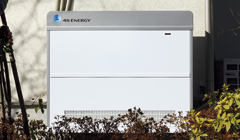 A household energy storage system
A household energy storage system
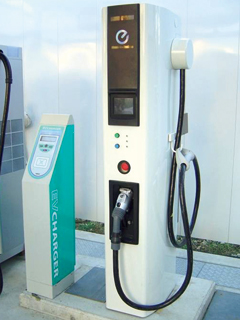 An authentication and billing controller (on the left side)
An authentication and billing controller (on the left side)
CSR through Social Contribution Activities
The Sumitomo Corporation Group is engaged in social contribution activities aimed at developing the next generation of human resources who will drive the sustainable development of society, and contributing to local communities in areas where we do business, all over the world. We also take part in various activities as a corporate citizen.
Youth Challenge Program for the Revitalization of East Japan
More than one year has passed since the Great East Japan Earthquake struck in March 2011. During this time, the assistance provided to disaster-hit regions has gradually changed. Sumitomo Corporation believes that an extensive period of time will be needed for these regions to recover from the devastation of this unprecedented natural disaster. Based on a policy of providing long-term assistance for recovery, Sumitomo Corporation is pressing ahead with support activities that fit the needs of the affected regions.
Immediately after the earthquake struck, Sumitomo Corporation began providing emergency assistance through such means as contributing relief money and delivering relief supplies. Thereafter, Sumitomo Corporation provided support in line with the needs of the affected regions at each point in time. For example, over the four months from August to November 2011, around 160 employees in total have continuously participated in our Volunteer Program for Earthquake Disaster Reconstruction. In parallel with these activities, we have also conducted our own surveys to grasp the needs of the affected regions. As a result, those surveys revealed that there was very little support for the younger generations in the affected regions to participate in the recovery effort. These generations range from high school students to university and graduate school students. In response, Sumitomo Corporation joined forces with the Civil Society Initiative Fund, an NPO, to launch the Sumitomo Corporation Youth Challenge Program for the Revitalization of East Japan to assist young people who will be the future leaders of the affected areas.
This program will provide subsidies of up to ¥100 million a year over the five-year period beginning with the fiscal year ending March 31, 2013. The subsidy will be designed to encourage the participation of younger generations in the regional revitalization process to rebuild the daily lives of people directly affected by the earthquake. At the same time, the program will support the growth of younger generations into leaders of the future. The program consists of two parts: the “activity and research” subsidy (subsidy commenced on June 1, 2012) and the “internship program” (activities commenced on July 1, 2012). The “activity and research” subsidy will support activities, surveys and research directed at regional revitalization that will be carried out mainly by younger generations in teams, circles, or groups, or by NPOs and other organizations led by youth. In fiscal 2012, the program has already subsidized unique activities reflecting the unmistakable enthusiasm of young people and their distinctive personalities. Examples include town restoration proposals, revitalization of local communities, and educational support for children who will be the next generation of young adults. Meanwhile, the “internship program” will encourage the creation of internships for young people at NPOs and other organizations active in the affected regions. The young people participating in this program share a strong dedication and responsibility toward the recovery of the affected regions, and are giving every effort to pursue their respective activities.
Through such support for younger generations participating in regional revitalization activities, Sumitomo Corporation will continue to provide long-term assistance for recovery, in the hope for the early recovery and revitalization of the affected regions.
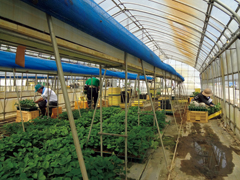 Our employee volunteers in Yamamoto town, Miyagi
Our employee volunteers in Yamamoto town, Miyagi
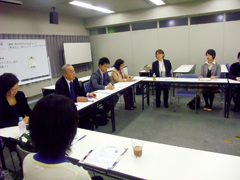 An orientation for the internship program
An orientation for the internship program
